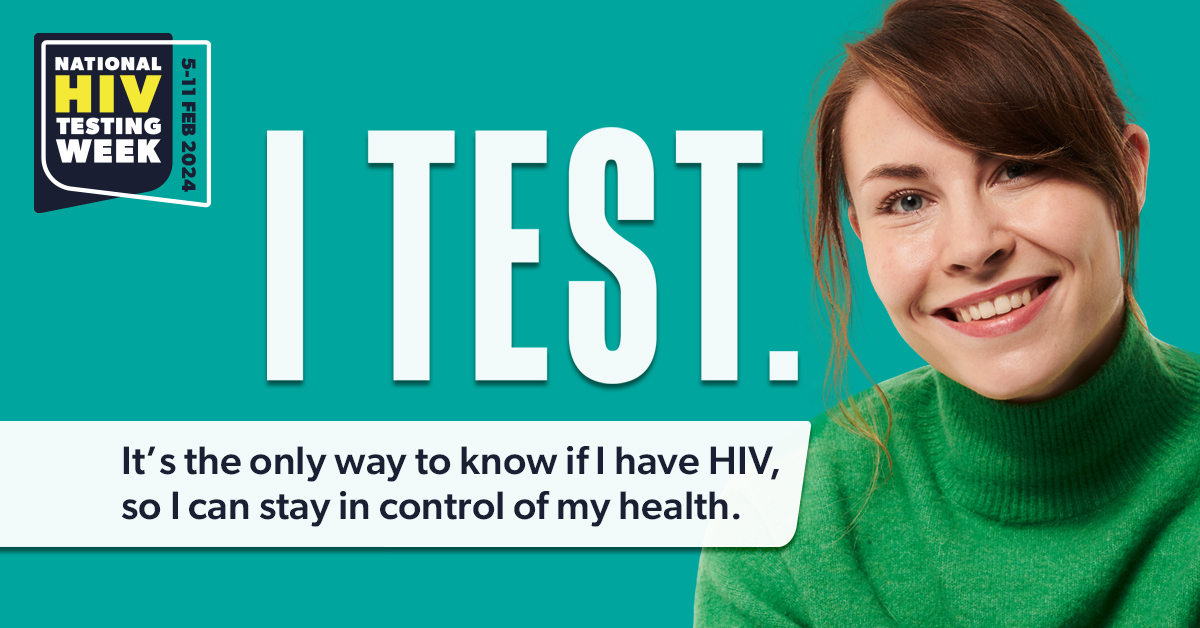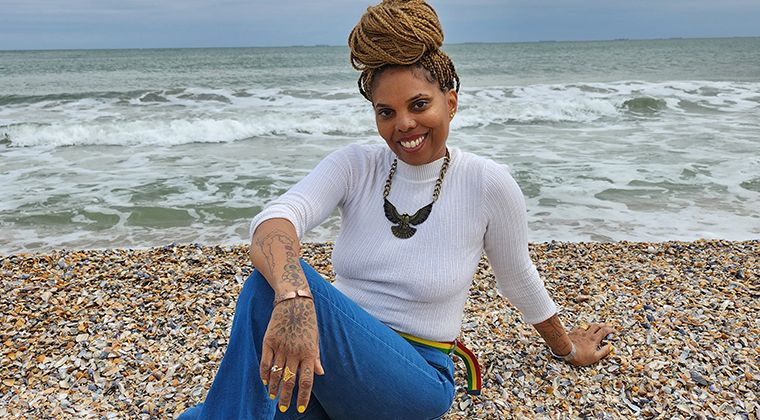
HIV testing rates among heterosexual men and women are down by a quarter compared to before the COVID-19 pandemic, according to the latest data from the UK Health Security Agency (UKHSA).
This comes as National HIV Testing Week starts today (Monday 5 February) with free at-home test kits available to anyone in England as part of the Government’s commitment to ending new HIV transmissions in England by 2030.
HIV testing rates among heterosexual women via sexual health services are 19% lower than in 2019, while rates among heterosexual men are even lower with a fall of a third (33%) over the same period. That’s why National HIV Testing Week focuses on normalising regularly testing for HIV with free test kits available to order via freetesting.hiv.
But, while the disruption of the COVID-19 pandemic has resulted in a significant drop in heterosexual testing, rates among gay and bisexual men are now at the highest level on record with a 23% increase over the same period (2019-2022). This includes an increase in testing seen in gay and bisexual men of all ethnicities.
National HIV Testing Week focuses on showing how easy it now is to test for HIV, particularly among those from groups most affected by HIV in the UK, including gay and bisexual men and people of black African ethnicity.
While testing rates are higher than ever before among gay and bisexual men, testing rates have fallen by 20% in heterosexual men of black African ethnicity and 6% in heterosexual women of black African ethnicity when compared to 2019. That’s why this week’s opportunity to test for free at home is vital, with the option to choose between self-testing and a result within 15 minutes, or self-sampling where you send off a small blood sample to the lab.
Testing is the only way to know if you have HIV. Most people get a negative result and then can make a decision about how to stay that way. While those who are diagnosed can start treatment to stay healthy and, once levels of HIV in the blood reach undetectable levels, can’t pass HIV on to partners.
The data shows heterosexuals are also far more likely to be diagnosed late with half (49%) of women and 57% of men diagnosed at a late stage, which is after damage to the immune system has begun. This compares to the national average of 44% and 37% of gay and bisexual men who are diagnosed at a late stage.
The number of new diagnoses among heterosexuals passed those in gay and bisexual men for the first time in a decade in 2020 and have continued to be higher each year since. In 2022, 30% (724) of first time diagnoses were in gay and bisexual men, while 23% were in women exposed by sex with men (564) and 16.8% were in men exposed by sex with women (411). That’s why it is important that everyone is aware of how to test for HIV.
In order to find the estimated 4,400 people living with undiagnosed HIV in England and drive down rates of late diagnosis, the Government has announced a new additional £20 million investment to fund a research project which will evaluate the expansion of opt-out HIV testing in A&Es to 47 new sites across England.
This expansion is a testing turbo charge which will result in an additional two million HIV tests being carried out over the next year. Data from the programme shows it helps find people who wouldn’t be reached by any other testing route and has already diagnosed or returned to care almost 1,000 people in just London, Brighton, Manchester and Blackpool in less than two years. It also helps to address inequalities with pilots showing those diagnosed in A&Es are more likely to be women, older and of black ethnicity.
Alongside free test kits being available during National HIV Testing Week, there are also testing events and drop-ins happening across England. Increasing testing in all groups is a crucial part of the Government’s goal to end new HIV transmissions within England by 2030.

Louise Vallace is a mother of three of black Caribbean heritage from London who was diagnosed with HIV in her late thirties. She never thought HIV would affect her and didn’t tell anyone about her diagnosis for a decade.
Louise said: ‛I always saw HIV as something that happened to other people, not me. The news floored me but I eventually came to terms with it and learned that HIV doesn’t limit me. Since being diagnosed, I’ve met the love of my life who I married last year and started my own business as an intersectional wellness coach.
‛Because of the daily medication I take, I live a healthy life and can’t pass on HIV to my husband. Yoga and wellness has given me joy and helped me understand an HIV diagnosis doesn't have to dictate my future. Stigma is a huge barrier to people testing for HIV, that’s why I want everyone to know this National HIV Testing Week that it is possible to thrive with HIV – but the first step is getting tested. Putting it off won’t change the result and undiagnosed HIV can damage the immune system.’
Chris Baxter is a heterosexual, white man from Chester who was diagnosed with HIV in 2017 aged 36. He had never tested before but did so after a former partner told him to. When he was diagnosed, Chris was informed he could have been unknowingly living with HIV for a decade.
Chris said: ‛My advice to other straight men is don’t be like me. I never, ever thought about testing for HIV until it was too late. I was full of myself and, as long as no one got pregnant, I didn’t think about testing for sexually transmitted infections. I know from experience that straight men are nightmares when it comes to anything around our health. That’s why I want to speak out and for others to learn from my story.’
Takudzwa Mukiwa, Head of Health Programmes at Terrence Higgins Trust, said: ‛It’s brilliant to see HIV testing at a record high among gay and bisexual men, but we need to see HIV testing levels among heterosexuals back up to where they were before COVID-19 and even higher too. Making sure that everyone with HIV is diagnosed and getting treatment is important to achieving our goal of ending new HIV transmissions in the UK by 2030. Most people will get a negative result, but it’s important to get tested and know your status.
‛It’s concerning to see testing rates among people of black African ethnicity – one of the groups most impacted by HIV in the UK – are still lower than before COVID-19. This is exacerbated by that fact that a quarter of black African men and third of black African women are not offered an HIV test when they attend a sexual health clinic. That needs to change and quickly. Because in order to end new HIV transmissions in this country, no one can be left behind.’
Health Minister Andrea Leadsom said: ‛HIV is most commonly spread by people who don’t know their status, so I encourage everyone to get tested as this is the first step to ending new HIV transmissions. Testing is quick, free and confidential, and is now even more convenient with the options of both self-sampling and self-testing.
‛As part of the HIV Action Plan, NHS England has invested £20 million in opt-out testing in emergency departments in areas of extremely high HIV prevalence, to ensure people get the right treatment as early as possible.
‛Given the programme’s success in diagnosing more than 3,000 people with a blood-borne virus over the first 18 months, we have announced an additional £20 million to fund research which will evaluate the expansion of the programme to 47 new sites across England.’
Dr Alison Brown, Interim Head of HIV Surveillance at the UK Health Security Agency, said: ‛Although we continue to see record levels of HIV testing among gay, bisexual, and other men who have sex with men we are now seeing lower rates of testing among women and ethnic minority groups, increasing the risk of HIV diagnoses being made late.
‛An HIV test is free and provides access to PrEP if needed. If you do test positive, treatment is so effective that you can expect to live a long healthy life and you won’t pass HIV on to partners. So please, no matter your gender or sexual orientation, get regularly tested, use condoms and get PrEP if you’re eligible, to protect you and your partners’ health.’
Find free HIV tests kits and information about where to get tested.
National HIV Testing Week is part of HIV Prevention England, which is coordinated by Terrence Higgins Trust on behalf of the Department of Health. It starts on Monday 5 February in England.



